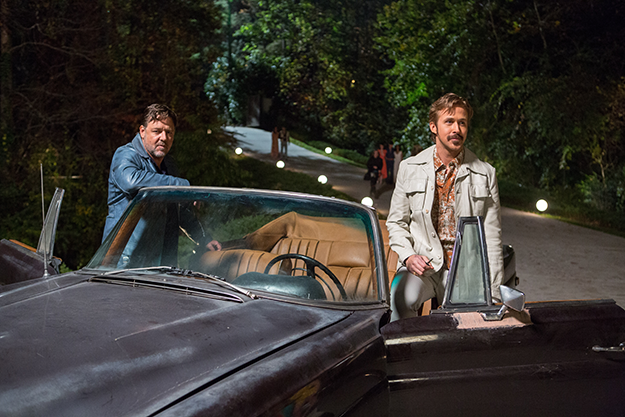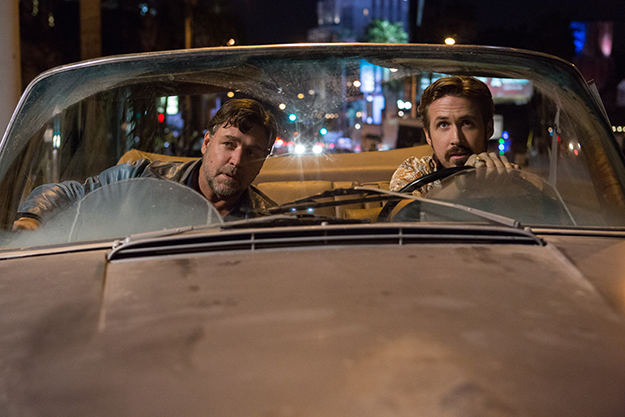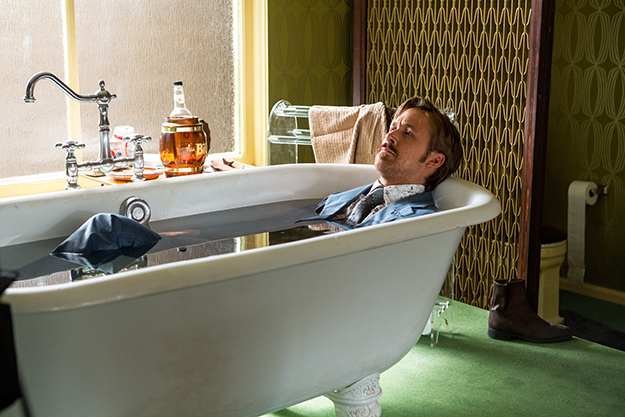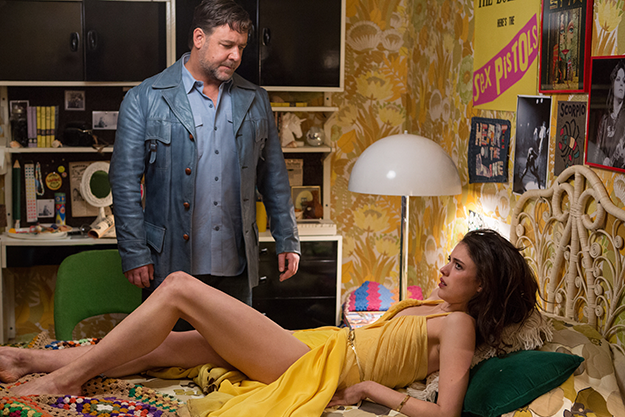Deep Focus: The Nice Guys
When he was winning praise for roles like the drug-addicted inner-city middle-school teacher in Half Nelson (06), Ryan Gosling told me in an interview that his favorite movie at age 13 was East of Eden. So I asked him if that meant he was a James Dean fan. He said: “As I get older, I’m just as much a Gene Wilder fan, or Buster Keaton or Bill Murray or Klaus Kinski or Abbott and Costello. They all get me somewhere; they all do it differently.” Co-starring with Russell Crowe in the schizoid, rickety new action comedy Nice Guys, Gosling gets to pull off bits that would fit each of those performers except Kinski.
As Holland March, a widowed L.A. private eye with a 13-year-old daughter, Holly (Angourie Rice), Gosling creates a malleable slapstick persona as a man who behaves like an alcoholic even when he isn’t drinking and retains a current of slyness and subterfuge even when he wants to play things straight. He’s so resigned to a life of sleaze and failure that he slips on psychic banana peels. When he takes genuine pratfalls, they’re unexpected and inspired because they emerge from his inner clown. The movie’s high point is a three-stage gag that starts with Gosling falling off a wall, continues with him plummeting down a hill and landing next to a corpse, and concludes with him trying to call for help while paralyzed with shock and fear. In that scene, he’s like Wilder, Keaton, Murray, and Lou Costello rolled into one.
The movie is set in 1977, the same year as Boogie Nights, and in one of the film’s better sour laughs about boys and girls growing up with escalating sexual awareness (and scant understanding of romance or erotica), a bike-riding youngster contends that he’s properly equipped for porno stardom (in the manner of Dirk Diggler). The SoCal media buzzes with smog alerts and reports about killer bees, while Gosling’s March complains—to the audience—about a seismic shift in his income since no-fault divorce wreaked havoc with a P.I.’s cash flow. The movie uses anything for immediate effect, including voiceover narration. Stylistically, it’s promiscuous.
March is ready to make money off any lonely, grief-addled spouse who wants him to find a missing mate, though he or she may be resting comfortably in an urn on the mantle. He still spouts off about a detective’s code, no matter how carelessly he exploits his clients. Then one of March’s aging customers contends that she’s seen her niece—a Cavalier centerfold and starlet named Misty Mountains (Murielle Telio)—after she’s been killed in a car crash. March does enough real gumshoeing to learn that the key to this mystery is Amelia Kuttner (Margaret Qualley), an anti-pollution activist who has performed in an “experimental” film herself. Amelia won’t be cornered or questioned: she knows that men (March and others) are following her, and she hires Crowe’s Jackson Healy to scare them off. Healy teaches a learning-annex course on his hard-guy brand of self-defense, but mostly works as a thug for hire. (He lacks an investigator’s license). After one exhilarating episode a year ago, when he saved a diner-full of customers from a crazed gunman, he resolved, no matter what the pay, to assault only sleazebags, like deadbeat husbands and dads and pot-dealing men who exploit young girls. Does March qualify?
Not really, but their close encounter of the bone-breaking kind (forgive me, but it is 1977) paves the way for a true partnership. Healy hires March to locate Amelia when she goes missing even from him, and Rice’s chipper young Holly, the movie’s moral center of gravity, approves of this new team. She sees Healy as a potential anchor and force for seriousness in her father’s wayward life. As the quest for Amelia catches them all up in a web of conspiracy that reaches to the top of the porn business, the state government, and the auto industry, these two relatively “nice guys” find that their opposite personalities mesh, or at least mesh enough, like a windbreaker zipper that stops an inch from the neck.
The director, Shane Black, who co-wrote the script with Anthony Bagarozzi, wants to whip up farcical black magic from the friction between Gosling’s loopiness as March and Crowe’s fierce directness as Healy. And Crowe, though at his heftiest, is stunningly confident as a throwback to a time when movie thugs looked like heavyweight wrestlers. It’s funny that Healy thinks thugs have a code, too: it comes down to getting a job done without making it personal. But Black fails to sustain their interplay. The director promises to create a comic world in which one man drifts into the vapors while the other keeps his oak-like legs planted to the ground. That’s the secret behind the scene in which March falls so marvelously off a wall. It occurs at a porn producer’s wild party, where the slick-less Healy relentlessly stalks Amelia while the semi-slick March gets soused and tries to mingle, even with the mermaids in a pool. After that sequence, Black shifts awkwardly between them, with a herky-jerky rhythm—emphasis on the jerky. So, for example, a realistic driving scene abruptly turns into a dream sequence and just as crudely whips back again. It’s blunt, not hilarious, like playing bumper-cars with reality. And though the director tries to give each man equal time, his clumsiness ends up reinforcing Healy’s smash-mouth approach. This movie makes you feel like a cartoon cat being slapped around by a mouse.
Provocative characters like Amelia’s mother, Judith (Kim Basinger), who heads California’s Department of Justice, augur that they’ll kick the film to a higher level, but it never gets there. Kuttner leads her state’s campaign against Detroit automakers for stalling on installing catalytic converters. Your brain swims with possibilities of putting it all together—porno, pollution, the car industry, the justice system—then drowns in the hyped-up crashing and bashing.
Nice Guys fails artistically but may thrive commercially on the brutal disconnect between its higher ambitions and the chases and beatings that power its antic melodrama. It’s a spectacularly consistent cock-up. Black repeatedly blows his chances even for razzle-dazzle choreography. A showdown at a car show should become a virtuoso climax, but Black and company send a film can packed with evidence careening across ceilings and floors, like a savagely flipped pinball, until the scene literally goes up in flames. And the movie with it.
Black created a vastly more successful private-eye pastiche 11 years ago, with Kiss Kiss Bang Bang. It took place entirely within a movie-movie universe that included Robert Downey Jr. as a bad thief mistaken for a Method Actor, Val Kilmer as a homosexual P.I. so upfront that he’s called “Gay Perry,” and chapter titles taken from Raymond Chandler. In Nice Guys, Black isn’t up to maintaining a closer relationship to the reality of 1977, when pop culture was DayGlo-colored and buoyant, though the environment was poisoned and the social fabric was tearing apart at the gas line and the voting booth. (California’s Proposition 13, the first salvo in a nationwide “taxpayer revolt,” was just a year away.)
The superb cinematographer, Philippe Rousselot (Hope and Glory, Henry & June) creates a lush, decadent, and sometimes decaying ambiance, especially during the porn producer’s bash in a modernist estate that looks like an alien space vehicle and twinkles from afar with crimson and emerald lights, like a naughty Christmas tree.
The scene looks marvelous but it makes you feel queasy when March’s daughter, a would-be Nancy Drew, noses around the party looking for Amelia. Angourie Rice has such a crisp youthful presence that she can often revive your spirits in the dankest, ugliest circumstance. Not here. March insists on proper diction, so when Holly tells him there’s “whores and stuff” at the party, he instructs her never to say “and stuff.” It’s supposed to get a huge laugh when Holly later instructs a porn star, “Don’t say ‘they were doing anal, and stuff,’ just say ‘They were doing anal.’” Nice Guys isn’t witty or elegant enough to satirize vulgarity. At one point Healy quips that Misty’s aunt “has actual Coke bottles for glasses. You paint a mustache on a Volkswagen, she says, ‘Boy, that Omar Sharif sure runs fast.”
Even seen through Coke-bottle glasses, The Nice Guys is no Kiss Kiss Bang Bang, much less The Big Sleep. It’s stuck with too many awkward mash-ups, and stuff.
Michael Sragow is a contributing editor to FILM COMMENT and writes its Deep Focus column. He is a member of the National Society of Film Critics and the Los Angeles Film Critics Association. He also curates “The Moviegoer” at the Library of America website.











